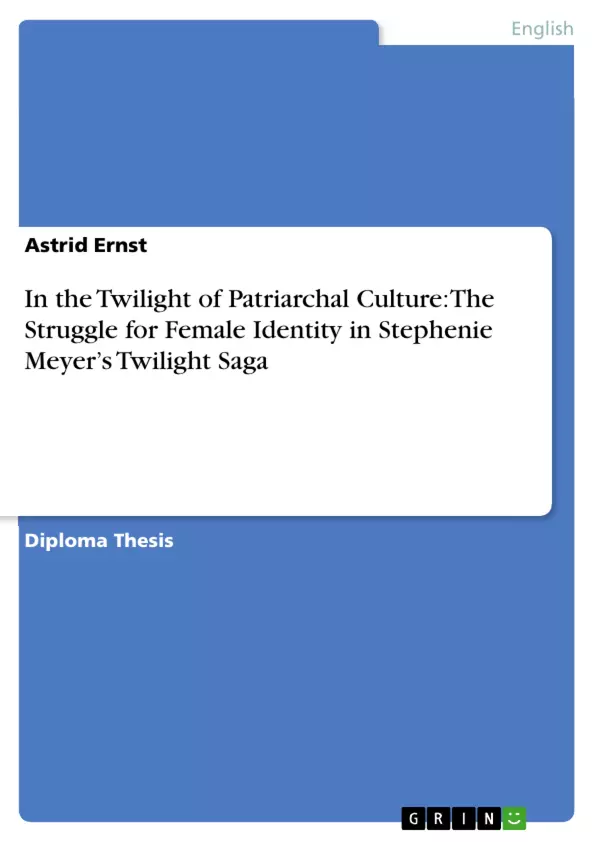The paper investigates Meyer’s popular saga from a feminist point of view focusing on the development of Bella’s character and her quest for identity in a rigidly patriarchal world, which forces her to choose between mutually exclusive options. It will be argued that Bella’s life is entirely determined by the two central male characters who form a polarized axis that slowly tears her apart. Bella’s low self-esteem and her strong attachment to the over-idealized Edward Cullen will be read as a symptom of her placelessness in a world that does not leave room for her to develop as an autonomous subject. Bella’s wish to become a vampire can be equalled with woman’s desire to gain access to a higher social realm via her husband and thus escape her marginalisation in patriarchal culture. As Beauvoir writes: “ There is no other way out for her than to lose herself, body and soul, in him who is represented to her as the essential, as the absolute”(Beauvior, The Second Sex, 653). In order to become a supposedly superior being and to live eternally in the idealized capitalist, patriarchal and puritanically Christian world Edward represents, Bella has to make a series of sacrifices. Leaving her mother behind she moves into a male dominated world which is divided into morally idealized Christian vampires and racially devalued werewolves. She is forced to give up her friendship with Jacob Black, who can be read as her free childlike self, in order to enter a world that again pushes her into the patriarchally pre-defined role of mother and wife. Similar patterns of stereotypical representations of femininity can be observed in various characters of the saga. A more controversial note is brought in by Bella’s half-vampire child who can be seen as a destabilizing factor of the saga’s rigid dichotomy. Taking all this into consideration we as feminists have to ask, whether it is desirable to have millions of young women worldwide admiring Bella and the mysogynist world in which she lives.
Table of Contents
- Introduction
- Tracing Bella's Subjectivity: Ideal Love as the Only Way Out
- Edward and Jacob: Magnets with reversed polarities or two poles of Bella's existence?
- The Cullen Vampires: the ideal family and its enemies
- Carlisle Cullen
- Esme Cullen
- Rosalie Cullen
- Alice Cullen
- The Cullens' Enemies
- Quileute Legends: re-affirming patriarchal myths.
- The Power of Abstinence
- The Dawn of Bella's Immortality
- Bella's transformations: marriage, pregnancy, motherhood
- Bella's new life: motherhood and other talents
- Renesmee: link between binaries, threat to the patriarchal order
- Twilight as Modern Fairy Tale: patriarchal myths reflected in the saga
- Little Red Riding Hood
- The Little Mermaid
- The Genesis
- Intertextuality: Twilight and Wuthering Heights
Objectives and Key Themes
This dissertation explores the depiction of female subjectivity and self-affirmation in Stephenie Meyer’s Twilight Saga, utilizing psychoanalytic and feminist perspectives. The study focuses on Bella Swan's character and her struggles within a patriarchal environment, highlighting the impact of societal expectations and binary oppositions on her development. The dissertation examines how Bella's relationship with Edward and Jacob influences her search for identity and self-realization.
- Female subjectivity and self-affirmation within a patriarchal setting
- Bella Swan's struggle for identity and self-realization
- The influence of societal expectations and binary oppositions on Bella's development
- The relationship between Bella, Edward, and Jacob as a representation of binary oppositions
- The portrayal of patriarchal myths and their impact on female characters in the saga
Chapter Summaries
The first chapter introduces the reader to Bella Swan, the protagonist of the Twilight Saga, and her initial situation marked by a lack of self-confidence and social marginalization. It argues that Bella's desire to become a vampire is driven by her need to escape her marginalized state and gain access to a "higher" realm represented by Edward and his vampire family. The chapter also explores how Bella's complete identification with Edward threatens her autonomy as a subject.
Keywords
The key themes of this work are female subjectivity, self-affirmation, patriarchal structures, binary oppositions, and the representation of female characters within a fictional narrative. The analysis draws on concepts from psychoanalysis and feminist theory to explore the complexities of Bella Swan's character development and her interactions with Edward and Jacob. The dissertation also examines the impact of patriarchal myths and societal expectations on female characters within the Twilight Saga.
Frequently Asked Questions
What is the main focus of this feminist analysis of Twilight?
The paper investigates Bella Swan's quest for identity within a rigid patriarchal world and how her life is determined by male characters.
How is Bella's desire to become a vampire interpreted?
It is seen as a desire to gain access to a higher social realm through her husband, escaping marginalization in a patriarchal culture.
What roles do Edward and Jacob play in Bella's identity?
They represent a polarized axis of binary oppositions that influence her search for self-realization and autonomy.
How does the saga reflect traditional fairy tales?
The dissertation links Twilight to patriarchal myths found in stories like Little Red Riding Hood, The Little Mermaid, and Genesis.
What is the significance of the child Renesmee in this study?
Renesmee is viewed as a destabilizing factor that potentially threatens the saga's rigid patriarchal dichotomy.
- Citar trabajo
- Astrid Ernst (Autor), 2011, In the Twilight of Patriarchal Culture: The Struggle for Female Identity in Stephenie Meyer’s Twilight Saga, Múnich, GRIN Verlag, https://www.grin.com/document/195974



